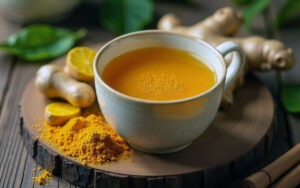Ginger and turmeric have been cherished for centuries in traditional medicine, particularly in Southeast Asia, where they’re known for their potent medicinal properties. Turmeric powder and fresh ginger are popular for their combined health benefits, particularly for their anti-inflammatory and antioxidant effects. When paired with black pepper, turmeric’s curcumin, a powerful antioxidant, becomes more bioavailable, amplifying its health effects. Here’s a closer look at why incorporating both into your diet might benefit your overall wellness.
9 Health Benefits of Consuming Turmeric and Ginger Together

Aid ease Inflammatory response
Turmeric extract and gingerol, found in turmeric and ginger, can help ease inflammation. This property is especially useful for those with inflammatory conditions, such as inflammatory bowel disease. The combination may support muscle recovery and joint comfort after physical activity.
Supports Digestive Health
Traditional medicine often uses ginger for its ability to soothe digestive discomfort. Combined with turmeric, it helps maintain digestive balance and help in calming occasional bloating.
Encourage good Immune Response
The high antioxidant levels in ginger and turmeric can support the immune system by combating oxidative stress. Antioxidants are essential for reducing cell damage caused by free radicals, which can otherwise weaken immunity over time.
Supports Heart Health
These spices may help maintain healthy blood pressure and blood sugar levels, potentially tackling the risk of heart-related concerns. Research suggests that turmeric may also support blood vessel health, helping maintain circulation.
Aids in Blood Sugar Management
Turmeric and ginger may help regulate blood sugar levels, aiding in metabolic health and insulin sensitivity. Adding these spices to meals, such as stir-fries or soups, can enhance both flavor and health benefits.
Eases Joint Discomfort
For those managing joint discomfort, the anti-inflammatory compounds in ginger and turmeric can be highly beneficial. Curcumin in turmeric can help with inflammation, and ginger may offer added comfort by supporting flexibility and managing swelling.
Contributes to Cognitive Health
Both spices contain antioxidants that support brain function. Regular consumption of turmeric powder and fresh ginger may contribute to memory and cognitive clarity by protecting brain cells from oxidative stress.
Encourages Skin Health
Known for their antioxidant properties, ginger and turmeric can support skin health. Including these spices in your diet may help maintain a youthful appearance and ease slow aging effect on the skin.
Assists in Respiratory Health
Ginger is traditionally used for its soothing effects on the respiratory system. When combined with turmeric, it may help maintain clear airways and support lung health.
Why Combine Ginger and Turmeric?
The benefits of turmeric and ginger are enhanced when combined. Turmeric’s curcumin can be challenging for the body to absorb, but pairing it with black pepper or ginger can increase its bioavailability, ensuring that you get the most out of these spices.
Everyday Tips for Incorporating Ginger and Turmeric
Incorporate turmeric powder and fresh ginger into meals like stir-fries, soups, and smoothies for a flavorful boost. If you prefer supplements, look for turmeric extract with black pepper to enhance absorption. There are many traditional and modern recipes that highlight the flavors and health benefits of turmeric and ginger.
Recipes made with turmeric and ginger

- Turmeric Ginger Tea
A soothing drink made by boiling fresh ginger slices and turmeric root or powder in water. Add honey and lemon for extra flavor. This tea is great for digestion and has anti-inflammatory properties. - Turmeric Ginger Chicken Stir-Fry
Marinate chicken pieces in a mixture of turmeric, ginger, garlic, soy sauce, and sesame oil. Stir-fry with your favorite vegetables, like bell peppers and broccoli, for a quick and healthy meal. - Golden Milk (Turmeric Latte)
Blend milk (or a milk alternative) with turmeric, ginger, black pepper, and a sweetener of choice. This comforting drink is known for its anti-inflammatory benefits and is perfect before bedtime. - Ginger Turmeric Smoothie
Blend together banana, spinach, fresh ginger, turmeric powder, almond milk, and a tablespoon of nut butter. This smoothie is packed with nutrients and makes for a great breakfast or snack. - Turmeric Ginger Quinoa Bowl
Cook quinoa and toss it with sauteed vegetables, chickpeas, turmeric, and ginger. Drizzle with a lemon-tahini dressing for a nutritious and filling meal. - Carrot and Ginger Soup with Turmeric
Saute onions, garlic, and ginger, then add chopped carrots, turmeric, and vegetable broth. Blend until smooth for a warm, comforting soup that’s rich in vitamins. - Spicy Turmeric Ginger Marinade
Combine turmeric, ginger, olive oil, vinegar, and spices to create a flavorful marinade for meats or tofu. Let it sit for a few hours before grilling or roasting.
Conclusion
Incorporating ginger and turmeric into your daily routine can significantly enhance your overall wellness. These spices not only add vibrant flavors to your dishes but also offer a remarkable array of health benefits, from supporting immunity to cognitive function. Their long-standing use in traditional medicine underscores their efficacy and importance in holistic health practices.
Remember the adage, “Health is wealth.” Investing in your diet with these spices is a step towards enriching your health. By exploring various recipes and embracing the unique flavors of turmeric and ginger, you can easily integrate them into your diet for a healthier lifestyle.

